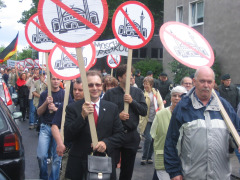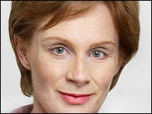 COLOGNE, Germany – In a city with the greatest Gothic cathedral in Germany and no fewer than a dozen Romanesque churches, adding a pair of slender fluted minarets would scarcely alter the skyline. Yet plans for a new mosque are rattling this ancient city to its foundations.
COLOGNE, Germany – In a city with the greatest Gothic cathedral in Germany and no fewer than a dozen Romanesque churches, adding a pair of slender fluted minarets would scarcely alter the skyline. Yet plans for a new mosque are rattling this ancient city to its foundations.
Cologne’s Muslim population, largely Turkish, is pushing for approval to build what would be one of Germany’s largest mosques, in a working-class district across town from the cathedral’s mighty spires.
Predictably, an extreme-right local political party has waged a noisy, xenophobic protest campaign, drumming up support from its far-right allies in Austria and Belgium. But the proposal has also drawn fierce criticism from a respected German-Jewish writer, Ralph Giordano, who said the mosque would be “an expression of the creeping Islamization of our land.”
The far-right party Pro Cologne, which holds 5 of the 90 seats in the city council, collected 23,000 signatures on a petition demanding the halting of the project. The city says only 15,000 of them were genuine. On June 16, Pro Cologne mobilized 200 people at a rally to protest the mosque. Among those on hand were the leaders of Austria’s Freedom Party, which was founded by Jörg Haider, and the extremist party Vlaams Belang, or Flemish Interest, from Antwerp. Both advocate the deportation of immigrants.
Manfred Rouhs, a leader of Pro Cologne, said the mosque would reinforce the development of a parallel Muslim society, and encourage the subjugation of women, which he said was embedded in Islam. “This is not a social model that has any place in the middle of Europe,” he said.
In this, he has found common ground with Mr Giordano, an 84-year-old Jew who eluded the Nazis in World War II by hiding in a cellar. Mr Giordano, who dismisses Pro Cologne as a “local chapter of contemporary National Socialists,” nonetheless agrees that the mosque is a threat. “There are people who say this mosque could be a step toward integration,” Mr Giordano said in an interview. “I say, ‘No, no, and three times no.’ Mosques are a symbol of a parallel world.”
“I don’t want to see women on the street wearing burqas,” said Mr Giordano, a nattily dressed man with the flowing white hair of an 18th-century German romantic. “I’m insulted by that – not by the women themselves, but by the people who turned them into human penguins.”
Henryk M. Broder, a Jewish journalist who is a friend of Mr Giordano’s, said he should have avoided the phrase “human penguins.” But Mr Broder said that his underlying message was valid, and that his stature as a writer gave him the standing to say it. “A mosque is more than a church or a synagogue,” he said. “It is a political statement.”
New York Times, 5 July 2007
Despite reporting that “public opinion about the project seems guardedly supportive, with a majority of residents saying they favor it”, the NYT devotes most of its coverage to the views of the bigoted minority.
See also David Vickrey’s comments at Dialog International, 5 July 2007
 Fundamentalist Christians in Germany are using populist slogans to incite hatred against Muslims, whom they see as the new source of danger for Europe. The number of internet users who visit their websites is alarmingly high. Claudia Mende reports.
Fundamentalist Christians in Germany are using populist slogans to incite hatred against Muslims, whom they see as the new source of danger for Europe. The number of internet users who visit their websites is alarmingly high. Claudia Mende reports.
 “‘No we are not racist. It is just that we need to preserve and protect our German identity and culture, and our Judeo-Christian heritage. The more Turkish Muslims come here, the less we know who and what we are. We cannot allow our identity and culture to be confused like that…’
“‘No we are not racist. It is just that we need to preserve and protect our German identity and culture, and our Judeo-Christian heritage. The more Turkish Muslims come here, the less we know who and what we are. We cannot allow our identity and culture to be confused like that…’ In the London Evening Standard (5 September 2007) Anne McElvoy expresses her admiration for the repressive methods pursued by Angela Merkel’s government in response to the threat of terrorism:
In the London Evening Standard (5 September 2007) Anne McElvoy expresses her admiration for the repressive methods pursued by Angela Merkel’s government in response to the threat of terrorism: COLOGNE, Germany – Never mind that a local brothel claiming to be Europe’s largest calls itself the Pasha and sports an ersatz arabesque theme. Some residents of this ancient city on the banks of the Rhine see the brothel as a shining example of their tolerance. But what irks them is that some Muslims want to build a mosque, complete with a dome and minarets.
COLOGNE, Germany – Never mind that a local brothel claiming to be Europe’s largest calls itself the Pasha and sports an ersatz arabesque theme. Some residents of this ancient city on the banks of the Rhine see the brothel as a shining example of their tolerance. But what irks them is that some Muslims want to build a mosque, complete with a dome and minarets.